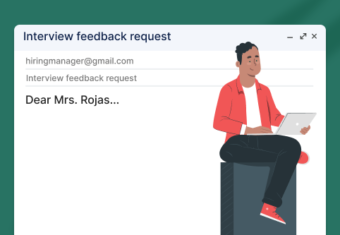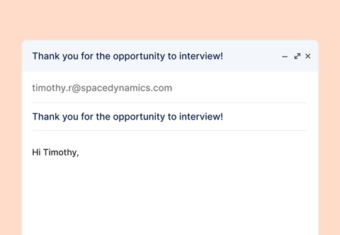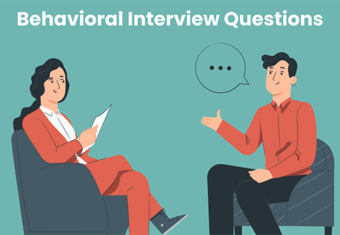Resume Genius’s Ida Pettersson and Jen Emmons, seasoned talent strategist and thought leader in the HR field, came together to chat about Jen’s experience as a human resources professional and what advice she has for job seekers looking to advance their careers.
Here’s what they covered during their discussion:
- The power of LinkedIn and social media when it comes to job searching
- Current employment trends
- What hiring managers look for in an application
- Job hunting advice
- Jen’s top tips for job seekers
Some quotes have been edited for clarity.
Meet Jen Emmons
Jen Emmons is a Senior Talent Strategist at Carex Consulting Group, a reputable career matchmaking firm. Carex is known for building lasting, transparent partnerships with top employers, while helping job seekers across the nation find their ideal career fit at no cost to them.
With a passion for helping people reach their career goals, Jen has made it her mission to support professionals at every step of their career journeys. Before joining Carex’s crew of career matchmakers, Jen honed her skills as a human resources expert in the Telecommunications and Energy industries.
When she’s not busy matching employers with talent, Jen shares her insights on all things HR in live podcasts, at conferences, and in print.
If you’re in the process of looking for a new job, here’s Jen’s advice to you:
How to use social media to your advantage
Social media is a useful tool for identifying job opportunities and gaining exposure as a professional. Below, Jen explains how you can make the most out of your online presence:
How important is personal branding for a job seeker?
Personal branding has never been more crucial, and let me tell you why. Social media has completely changed the landscape. And I think it’s important to take a step back and really understand what [personal branding] is.
Personal branding is your unique combination of skills, experience, personality, and also your public perception. And you might ask, “Well, why think about it?”
Quite frankly, I don’t know if candidates think about it enough. But personal branding really helps you to take some time to be introspective and to really understand “What am I about? How am I showing up? How am I influencing others?”
And when you’re clear on that, it’s going to help make sure that your decisions in your career are congruent with your values.
Employment trends you should be aware of as a job seeker
Listen as Jen goes over the top trends affecting job seekers in 2023:
What does someone looking for work in 2023 need to know?
Competition for talent in 2023 has never been stronger, and I think a big reason for that is that in the past, you were typically competing against people locally. But COVID and the rise of remote work and hybrid work has opened up searches that normally were just local searches to at least regional, if not national, searches. So you have competition on a far greater scale than ever. That’s one thing.
Another thing would be social media checkers. I have looked at data and in 2010, for example, approximately 25% of companies were checking social media. By 2018, it rose to 70% and in 2022, over 30 million employers were checking social media.
So be a smart curator of your content. Ensure that it’s not including content that is discriminatory, or is highly politicized, or bashing somebody, or just negative in some way. Because those are things that employers are going to take issue with.
How important is cultural fit and how can a job seeker show that they would be a good cultural fit for a company?
As a talent strategist and as a recruiter, culture has never been more important. In the past, I really feel it used to be a “nice to have”. But these days more and more companies are considering this a must have. I think that’s a good thing, really. If you think about it, poor cultural fits can create toxic work environments.
You can have a candidate that doesn’t feel comfortable in that culture and that typically leads to retention issues as well. It can lead to performance issues. So it’s really important for the company and the candidate to be a good match.
And then as far as the job seeker, I think it’s imperative again that they know … what culture is best for them to thrive in. Because again, unfortunately, I think a lot of times people don’t think about that. They’re thinking about “Where do I want to work? What is my salary? What are my hours? Do I get remote?” And they don’t think about the culture as much.
What are the biggest differences between job hunting today and job hunting 10 years ago?
I would say the biggest difference between job hunting today and ten years ago would be, again, social media. It matters. And the competition for talent has never been more fierce. Keep your skills relevant, no coasting.
And again, there’s more tools and templates at your fingertips than ever before … In the past, you know, you had to do everything from scratch and now you have so much at your disposal.
Is there any advice you used to give to job seekers that is no longer relevant?
Yes, I would say that [in the past], individuals that were strong technically — it didn’t matter how bad of an attitude [they had] or how hard they were to work with, they were pretty safe.
I’d say today, because culture is becoming increasingly important to organizations, it does matter how you show up. It does matter how you interact with others. So I would say that that excuse “Well, they’re strong technically, it’s okay” is out.
Another thing that you see changing is having to be completely qualified. And what I mean by that is — and this was women more than men — they would look at the job posting and if they did not meet every qualification they’d move on.
Unless you’re a federal contractor and it’s a minimum requirement, which typically only 3 to 5 things on any job posting are, if you are pretty closely aligned, I’d say go for it.
How to nail your job application
Regardless of experience level, many professionals find writing a resume and crafting a compelling cover letter to be the most challenging part of the job search process.
To take the guesswork out of putting together a convincing job application that ticks all the boxes for recruiters, Jen provides her insights as someone who has been on both sides:
In your opinion, what makes an impactful cover letter?
As far as cover letters go, I would first start by saying some argue that cover letters are obsolete. And like anything else, “never” and “always” are not good words, because there are always going to be positions and companies that expect it and require it. So I would recommend to get a good template and use that. Don’t rule out cover letters completely.
Think of a cover letter as an opportunity to start building your relationship. You are differentiating yourself and you’re helping to connect the dots so that people are really clear on what you’re bringing and how that aligns with the opportunity that they’re recruiting for or hiring for.
What you need to know before beginning your job hunt
Before you start applying for jobs, here’s what you need to know to maximize your chances of securing a fulfilling position where you’re compensated fairly for your work:
What are common red flags job seekers should look out for during the application process?
One of the things to look out for that should be a big red flag in the process would be a never ending recruiting process where requirements are changing, things are being rescheduled, and just general disorganization. That’s a sign that there’s something going on behind the scenes.
Another thing you might look out for too is [if you] are being given an opportunity to talk in the interview. That should be a red flag, if the hiring manager or other interviewers are doing all the talking. Also, are your questions being glossed over? That could be a sign that maybe they don’t completely know what they need to know about the role.
I would also be aware of your interactions. Are you being welcomed? Are you being treated with courtesy and respect? Because [not being treated with respect is] a really big red flag as far as the environment and the culture. They may be giving you a sneak peek of what it’s like after you walk through the door.
Should job seekers reach out to recruiters themselves?
When people ask “should job seekers reach out to recruiters?” I will smile and say it depends.
Because again, on the agency side, that’s fine. They reach out to us. We want to hear from you. And it’s often expected.
On the corporate side — where I did spend most of my career — that I wouldn’t say is quite as desirable. And I’ll tell you why:
Most corporate recruiters have 30, 40, some up to 70 positions that they’re recruiting for. So that phone call may not be as appreciated. I encourage people to make the most of the interactions they [do] have.
What advice do you have for job seekers looking for flexible employment opportunities?
If you’re looking for nontraditional employment opportunities, the one thing I would [say to] encourage you is: they are out there. You just have to know where to look.
You might want to try sites like FlexJobs, and I would really encourage you to also network. Find out from friends, coworkers and individuals in your profession, industry, professional associations, and find out the opportunities that they have found. That’s one of the best ways.
I would also encourage you to be creative. You know, propose [flexible work] opportunities. And when you do that, make sure though that you are always helping [the employer] understand why this is good for their business. It’s good for the company, it’s good for the team, not just why it’s good for you.
Jen’s top tips
Finally, here are Jen’s top tips to help you succeed in your job hunt:
About Resume Genius
Since 2009, Resume Genius has combined innovative technology with leading industry expertise to simplify the job hunt for people of all backgrounds and levels of experience.
Resume Genius’s easy-to-use resume builder and wide range of free career resources, including resume templates, cover letter samples, and resume writing guides, help job seekers find fulfilling work and reach their career goals. Resume Genius is led by a team of dedicated career advisors and HR experts and has been featured in The New York Times, Forbes, CNBC, and Business Insider.
For media inquiries, please contact us.
Build your resume in minutes
Use an AI-powered resume builder and have your resume done in 10 minutes. Just select your template and our software will guide you through the process.















